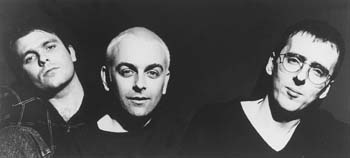![[Metroactive Music]](/music/gifs/music468.gif)
[ Music Index | Metro | Metroactive Central | Archives ]
Beaucoup Beats
 Notes from the Underworld: 'Beaucoup Fish' is an emotional voyage through dance-music history. Underworld's Darren Emerson talks about the band's beautiful new album By Michelle Goldberg 'CUPS," THE FIRST SONG on Beaucoup Fish, Underworld's dazzling new album, establishes the tension that animates the record: a divide between lush, elegant ambiance and rough, throbbing dance anthems. At 11-plus minutes, the song begins as a smooth, sophisticated stream of classic techno, Karl Hyde's distorted vocals stretched out like a canopy over the undulating beats. After several minutes, though, the liquidlike reverie turns spare, hard and urgent. Imagine beginning a night at a swanky, polished lounge with a DJ trying only to caress your ear and facilitate cocktails and conversation. Drinks are downed, and the night gets messier. You head into the city and find some tiny club full of sweating kids. With the right company of the right chemicals, the whole idea of coolness falls away, and there's just release. That's what "Cups" sounds like. Though it's something of a cliché by now to say that an electronic album is like a journey, much of the music on Beaucoup Fish really does feel like a kind of emotional voyage, both through a night and--with its generous nods to disco and early techno--through soulful dance-music history. After breakbeat, jungle, trip-hop, neo-turntablism and a thousand and one other small evolutions, it's rare to find a new Detroit-style techno record that doesn't feel hopelessly nostalgic. "I was a house fanatic when I was 16 and 17, so that stays in there," Underworld's DJ, Darren Emerson, says. "You can't get rid of that," he adds. "When you're writing, you're not copying anything, but it just comes out--that warm feeling, some of the strings and the deepness, it stays in the brain, and it releases every now and again." But Emerson's grooves are balanced and contrasted by Hyde's chilly singing and by a streak of evocative moodiness. In places, Beaucoup Fish is haunting and ambient, with a bit of darkness and paranoia underlying cascades of metallic percussion. There are also very subtle hints of drum 'n' bass and hip-hop scratching on the record, but they never feel gimmicky or overly trendy because Underworld's vision is so solid that all the album's elements--including touches of rock--are subsumed in it. Underworld has never been a purely electronic act. After all, it started life as a New Wave band, and the trio still has both a singer and a guitarist. Nevertheless, on much of Beaucoup Fish, Underworld sounds more like a descendent of Derrick May than a kin to Prodigy, and Emerson is eager to distance himself from Underworld's previous incarnation. "The New Wave band has got nothing to with what we're doing now," Emerson insists. "I'd never been in that band. Karl and Rick got dropped from Sire, and they were getting interested in dance music, so they came to me. When we first started, I was just doing it for fun. I was treating Underworld as a hobby. I wasn't going to be in the band, I was just going to produce the band. I didn't know what they'd done until after I'd gotten in the studio, and I said, 'Fuck that, that's awful.' But they wanted to learn about dance music, and I wanted to learn about working in a studio." Since Emerson joined Underworld, it has created one of the most recognizable and cohesive sounds in all of electronic music, combining warm, soft bass lines, barely recognizable jolts of guitar, string and piano samples, and low-in-the-mix singing processed into an echoing digital hum. Underworld's sound merges joyful organic richness and thrilling pacing with an undercurrent of noir. Underworld is, deservedly, most famous for "Born Slippy," the propulsive anthem off the Trainspotting soundtrack. No single song on Beaucoup Fish has that track's adrenaline kick or addictive hook, yet the album as a whole is better than Second Toughest in the Infants, the 1996 Underworld album to which "Born Slippy" was added after the film made it a hit. Several songs have that old four-to-the-floor rhythm, the piano motifs and layered synths. For all that, however, they still sound new. Tracks like "Kittens," seven minutes of driving, tightly arranged dance-floor incitement surrounding a dreamy, swirling interlude, seem designed with Ecstasy in mind in a way that one hardly ever hears anymore. "I've experienced doing things like [Ecstasy] before, so that's one reason why I like the deepness," Emerson explains. "I've always liked the warm, luscious bass. When you're in a higher state you want feel-good music. This album does have a bit of that." On Beaucoup Fish, Hyde's deadpan vocals are closer to the forefront of several songs than they were on the last album, though often the lyrics are so surreal or unintelligible that the singing works more as another instrument than it does as narrative. Emerson's voice gives the album a kind a conceptual unity, even if, with the exception of the lovely, doleful "Skym," almost all the band's passion is in the music, not the words. One of the wonderful ironies of Underworld is that the band's exuberance comes largely from its computerized beats and symphonic samples, while its frosty futurism is located in a man's voice manipulated until it sounds like a machine. [ San Jose | Metroactive Central | Archives ]
|
From the April 22-28, 1999 issue of Metro.
Copyright © Metro Publishing Inc. Maintained by Boulevards New Media.